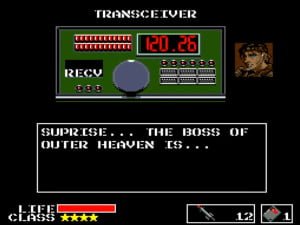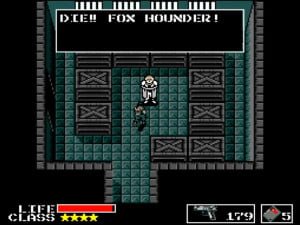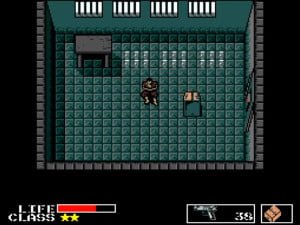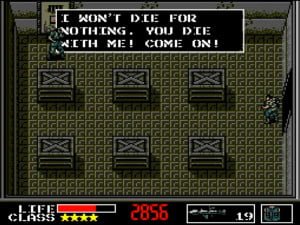Codec Logs is a retrospective Metal Gear letter series by Blake Foley and Sean Gandert. An index of the letters can be found here.
From: Sean Gandert
To: Blake Foley
Subject: Stop the Operation. Switch off Your MSX at Once.
 Let’s start with the big twist: does Big Boss’s turn at the end of the game make any sense? In and of itself… no, not really. The explanation that he never thought you’d get that far doesn’t really pan out—after all, it would be much easier for him to send in someone far more incompetent than Snake for the mission. Likewise, he’s aware of your location at essentially every step along the way and could easily betray you. At one point in the game you’re actually captured, and that would be a perfect time for Big Boss to kill off Solid Snake and end the narrative. And really, I could keep going here with a multitude of other reasons why this storyline is filled with more holes than a whiffle ball, but I’ll save you the time by just saying that as far as narratives go this one’s a mess and a half.
Let’s start with the big twist: does Big Boss’s turn at the end of the game make any sense? In and of itself… no, not really. The explanation that he never thought you’d get that far doesn’t really pan out—after all, it would be much easier for him to send in someone far more incompetent than Snake for the mission. Likewise, he’s aware of your location at essentially every step along the way and could easily betray you. At one point in the game you’re actually captured, and that would be a perfect time for Big Boss to kill off Solid Snake and end the narrative. And really, I could keep going here with a multitude of other reasons why this storyline is filled with more holes than a whiffle ball, but I’ll save you the time by just saying that as far as narratives go this one’s a mess and a half.
But then, that’s all trying to apply real world logic to a very video game-y video game, which is the wrong way of thinking about Metal Gear. There are a handful of hints that Big Boss may not be all he claims early on—I don’t think he forgot to tell you about the gas room, rather he hoped you’d die there—but for the most part the twist works because it’s very satisfying as a game scenario. His name, after all, is Big Boss, but more than that it’s for some reason enjoyable to be able to interact with one of the bodiless voices you’ve been dealing with for the entire game. Since the only way of doing so in an action title like Metal Gear is to shoot them, that’s what happens. Aside from that, as far as games go the twist was something new, clever in its execution if not its logic, and had a perfect understanding of how much this should matter to both the story and gameplay of an 8-bit title. It’s far from perfect, but that doesn’t mean it’s a bad twist.
It’s also related to one of the highlights of the game’s story (the other being Steve’s ineffable existence), when Big Boss asks us to turn off the video game console. I couldn’t help but think of this in relationship to Bioshock‘s twist—which is really the twist of all video games, as frustrating as that may be. However, by inverting the equation, Metal Gear asserts a player’s power of choice, while Bioshock negates it. In order to beat Metal Gear we have to disregard a character’s request to turn off the system, while in Bioshock the only way of not doing what’s asked of us is to stop playing the game. Neither of these are fair “decisions,” but Metal Gear doesn’t pretend that this ever was one, and doesn’t look down its nose at players for wanting to play a game. Instead, it’s a bold post-modern joke that asks players to look at everything else in Metal Gear under a slightly different light. Much like Steve, this joke expands the game’s universe, but here it’s in a strange and unexpected new direction.
 Like you, I got bogged down when I hit the game’s second building. I think part of it is that the story, as fascinatingly weird as it may be at times, is too minimal while the gameplay tends to be same-y. The quest for keyard six is, for obvious reasons, not as interesting as the quest for keycard one. There’s also a lot of backtracking that’s deliberately nasty to the player, from one-way elevators to trucks you’re liable to enter into because there’s no sign that these will penalize you with a trip back to much earlier parts of the game. It’s only when the story begins to heat up with Big Boss’s betrayal that Metal Gear regains its urgency. That’s the other thing about his betrayal that works so well: the game needed a reason to keep playing at that point, and this change in your relationship with the game’s most prominent NPC is much bigger than, for instance, if the game suddenly decided that you need to destroy a couple dozen Metal Gears and also a nuke factory and maybe also rescue buried treasure while you’re at it (McGuffins, even nuclear-launching ones, are only middling as far as game motivations go). Since the theoretical stakes couldn’t be larger and are kind of irrelevant anyhow, Metal Gear raises the emotional stakes, which is no mean task considering the limited scope of its characterization.
Like you, I got bogged down when I hit the game’s second building. I think part of it is that the story, as fascinatingly weird as it may be at times, is too minimal while the gameplay tends to be same-y. The quest for keyard six is, for obvious reasons, not as interesting as the quest for keycard one. There’s also a lot of backtracking that’s deliberately nasty to the player, from one-way elevators to trucks you’re liable to enter into because there’s no sign that these will penalize you with a trip back to much earlier parts of the game. It’s only when the story begins to heat up with Big Boss’s betrayal that Metal Gear regains its urgency. That’s the other thing about his betrayal that works so well: the game needed a reason to keep playing at that point, and this change in your relationship with the game’s most prominent NPC is much bigger than, for instance, if the game suddenly decided that you need to destroy a couple dozen Metal Gears and also a nuke factory and maybe also rescue buried treasure while you’re at it (McGuffins, even nuclear-launching ones, are only middling as far as game motivations go). Since the theoretical stakes couldn’t be larger and are kind of irrelevant anyhow, Metal Gear raises the emotional stakes, which is no mean task considering the limited scope of its characterization.
The worst stealth section I’ve ever played in a game was probably in The Legend of Zelda: The Wind Waker, which had exactly the problems you described. Aside from that, though, there was an issue with how stealth affected the game’s tempo. Video games are like any other medium in that quality has little to do with pacing—book by William Gaddis may be far longer than a collection by Alice Munro, but its moment-to-moment reading experience is much faster due to his ping-pong dialogue. Likewise, Metal Gear is slow, but it’s intentionally slow, and it’s designed around that pacing at almost every step of the way. Action games that suddenly jump into stealth sections are like coming off the freeway going 80 mph and going straight into a 30 mph zone with known speed traps.
 It’s funny to me that you mention Steve as Diane’s brother, because I assumed he was her boyfriend. That may say more about me than about the game, though, and in fact I love how little he’s sketched out. Where Big Boss’s order to turn off the system emphasizes the way Metal Gear is a game, Steve and Diane’s weird interactions reemphasize that these are people and there is a “reality” here. There’s a spectrum of video game stories that goes between Suda 51’s post-modern “Look, It’s a Game!” irony to Call of Duty’s “This Is the Most Serious Thing in the World” pretension, and Metal Gear manages to sit very nicely in the middle. The push-pull dynamic between these two halves of things are a lot of what makes this series unique, even this early on. Yes, the fate of the world is at stake, but oblivious Steve is still the one who answers the telephone.
It’s funny to me that you mention Steve as Diane’s brother, because I assumed he was her boyfriend. That may say more about me than about the game, though, and in fact I love how little he’s sketched out. Where Big Boss’s order to turn off the system emphasizes the way Metal Gear is a game, Steve and Diane’s weird interactions reemphasize that these are people and there is a “reality” here. There’s a spectrum of video game stories that goes between Suda 51’s post-modern “Look, It’s a Game!” irony to Call of Duty’s “This Is the Most Serious Thing in the World” pretension, and Metal Gear manages to sit very nicely in the middle. The push-pull dynamic between these two halves of things are a lot of what makes this series unique, even this early on. Yes, the fate of the world is at stake, but oblivious Steve is still the one who answers the telephone.
I don’t want to ignore your last question, as to the effects of Kojima’s story revisions, but unfortunately I don’t think it’s one I can answer terribly well because I simply haven’t played enough of the series yet. That being said, having spent some time looking at what changed between versions, most of the differences simply improved the writing or made the UI more modern (the original MSX2’s inventory screen looks pretty dated). It would be frustrating if Kojima changed something major, but for the most part it looks like he wanted to fix things for clarity, and every gameplay aspect of Metal Gear seems like it plays identically to the original.
 There are a few reasons why I feel Kojima’s changes are different from, for example, George Lucas updating the Star Wars films. One is simply a matter of translation. The fact is, we don’t know how well the original versions translated his Japanese scripts, and it seems likely that many changes simply reflect a different translation. Whether they’re now more literal or not (and literal in no way means better) I’m not able to judge, but I suspect that Kojima’s English has improved a great deal since the 80s and that the newer versions reflect more of the original Japanese intent. It’s also a simply a matter of the medium being different. Games are a medium about experience, and updating aspects like the UI undoubtedly change things, but not in a way I mind. Does Arnold’s being replaced with Bloody Brad change your experience of the game? Perhaps a tiny bit, but I doubt it’s very much, and it’s by no means a question of whether or not Han shot first. I read an interview with Kojima where he was asked about updating Metal Gear and Metal Gear 2: Solid Snake. He said he had no interest in this because he’d have to rewrite them essentially from scratch. He’s correct, a 3-D version of Metal Gear is a different beast entirely (I think we’re both very wary of the forthcoming Final Fantasy VII remake for precisely this reason), and what works in 8-bit sprites doesn’t necessarily translate into polygons. In recognizing this, we see that he understands that some things shouldn’t be tinkered with even when rereleasing games.
There are a few reasons why I feel Kojima’s changes are different from, for example, George Lucas updating the Star Wars films. One is simply a matter of translation. The fact is, we don’t know how well the original versions translated his Japanese scripts, and it seems likely that many changes simply reflect a different translation. Whether they’re now more literal or not (and literal in no way means better) I’m not able to judge, but I suspect that Kojima’s English has improved a great deal since the 80s and that the newer versions reflect more of the original Japanese intent. It’s also a simply a matter of the medium being different. Games are a medium about experience, and updating aspects like the UI undoubtedly change things, but not in a way I mind. Does Arnold’s being replaced with Bloody Brad change your experience of the game? Perhaps a tiny bit, but I doubt it’s very much, and it’s by no means a question of whether or not Han shot first. I read an interview with Kojima where he was asked about updating Metal Gear and Metal Gear 2: Solid Snake. He said he had no interest in this because he’d have to rewrite them essentially from scratch. He’s correct, a 3-D version of Metal Gear is a different beast entirely (I think we’re both very wary of the forthcoming Final Fantasy VII remake for precisely this reason), and what works in 8-bit sprites doesn’t necessarily translate into polygons. In recognizing this, we see that he understands that some things shouldn’t be tinkered with even when rereleasing games.
That being said, I suspect that story convolutions will get much worse once there’s more, well, story, and retroactive continuity will be rearing its ugly head before too long. But that’s a completely different concern, and if tiny revisions now help remove some of that in the future, then I’m all for them.
I think I’m ready to move onto the next title, but I’d like to hear any final thoughts you have on Metal Gear before we start talking about its sequel. I don’t know that I have any questions for you right now, aside from whether you’d be up for developing a full-on Steve sidestory adventure game—come on, Telltale, you’ve already licensed everyone else, and Steve’s at least as interesting as anything in Borderlands.




